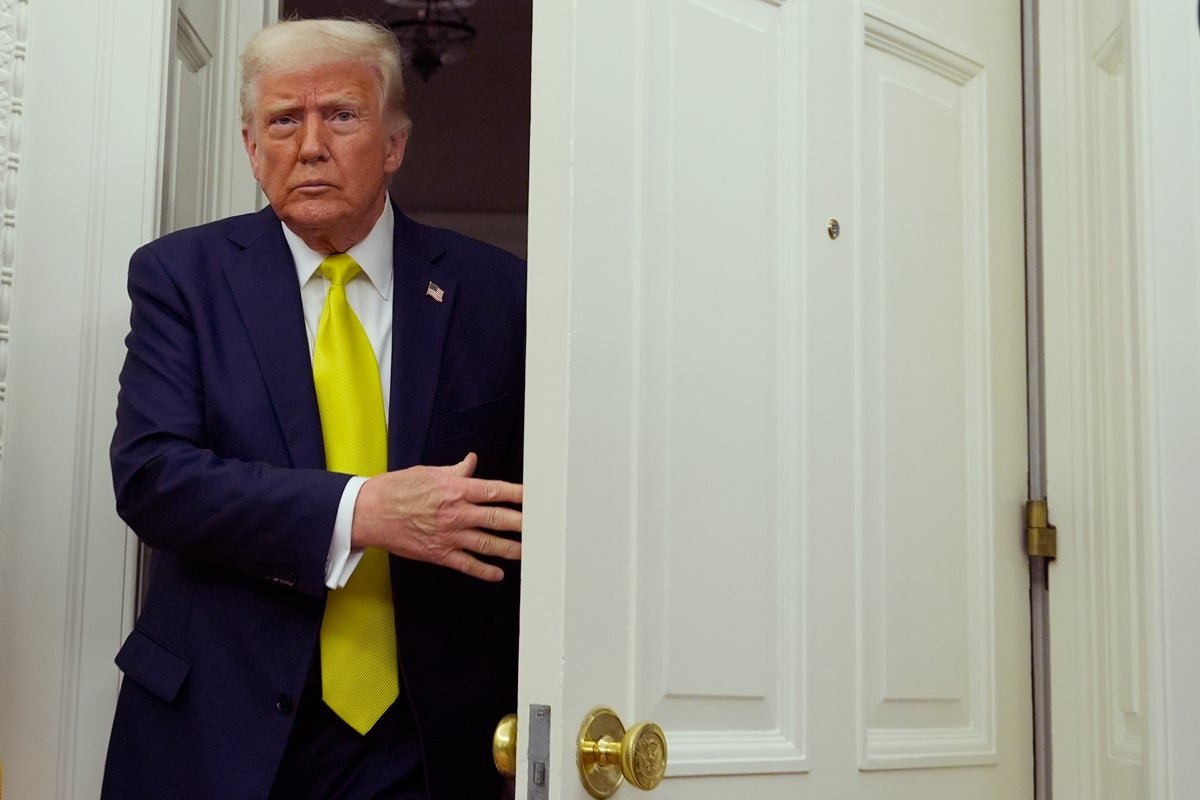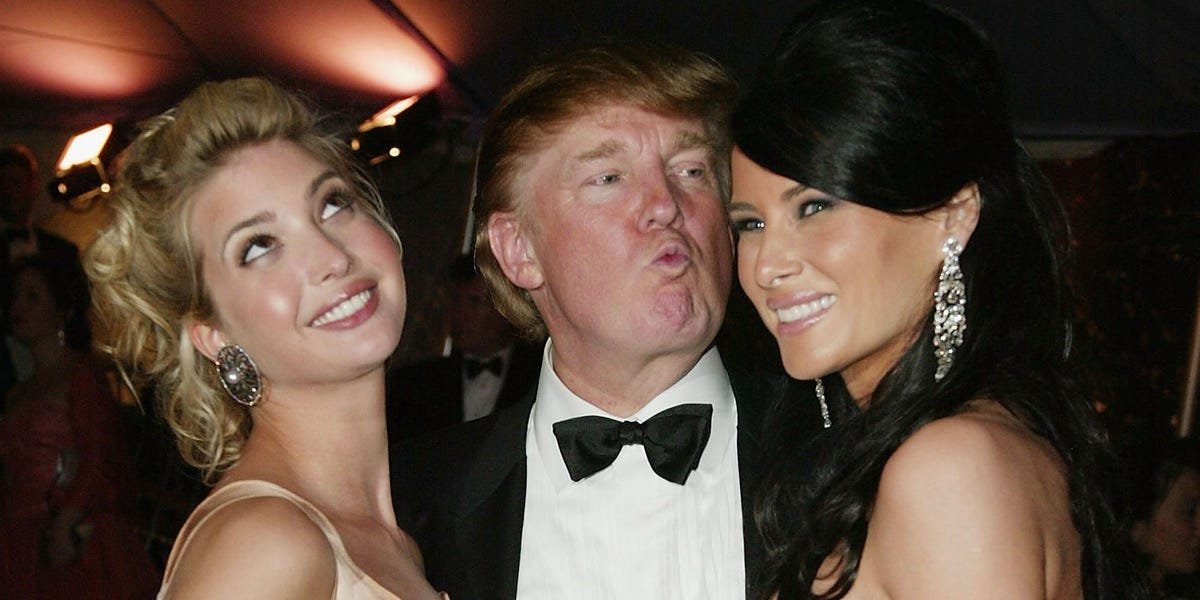Notifications can be managed in browser preferences.
Please refresh the page or navigate to another page on the site to be automatically logged inPlease refresh your browser to be logged in
Vice president J.D. Vance said the ‘rebalancing’ from aggressive tariffs would ‘produce great benefits for American workers’
I would like to be emailed about offers, events and updates from The Independent. Read our Privacy notice
Vice president J.D. Vance has admitted that President Donald Trump’s aggressive tariff increases will profoundly change the U.S. economy and other nations.
In a speech in India, Vance said the ‘rebalancing’ from aggressive tariffs would ‘produce great benefits for American workers’.
It came after gold prices hit a new record high while the value of the U.S dollar plunged, following Donald Trump’s latest attack on the Federal Reserve Chair Jerome Powell.
Trump claimed on his Truth Social platform that the US economy could slow unless Powell immediately lowered interest rates.
Trump has also previously threatened the central bank chair’s “termination” was coming soon, but the president does not have the power to fire him.
It comes as reports have emerged that Defense Secretary Pete Hegseth shared details of upcoming military strikes against the Houthis in Yemen in a second Signal chat.
That chat group included his own wife and brother, according to the New York Times. A White House spokesperson said no classified information was shared in the group.
Hegseth is set to appear on Fox & Friends on Tuesday morning when he will likely be asked about his latest scandal.
Donald Trump’s defense secretary Pete Hegseth has come under fire after it was revealed he shared details of a U.S. military operation in a second Signal group chat.
That chat group included his wife, brother and personal lawyer, according to the New York Times reporting, and Democrats have called for his resignation.
When asked about the revelations during the White House’s Easter Egg Roll, Trump said the criticism was “fake news” and a “waste of time”, the Guardian reports.
The president said he had full confidence in Hegseth.
“He’s doing a great job — ask the Houthis how he’s doing,” the New York Times reported.
Britain’s FTSE edged higher on Tuesday morning after a Bank of England official commented on U.S. tariffs.
Megan Greene told Bloomberg that Britain would likely experience lower inflation due to President Donald Trump’s tariffs, because the U.K. could become the market of choice for cheaper Asian and European goods originally destined for the U.S.
Financial markets have fully priced in a rate cut at the Bank of England’s next policy meeting on May 8.
In response, the FSTE 100 was up 0.3 percent by mid-morning, and an index of Britain’s precious metal miners rose by 2.4 percent to a three-year high after gold prices briefly surpassed an all-time high of $3,500 an ounce.
Investors are also waiting on a speech from the Bank of England’s deputy governor Sarah Breeden later today, for further insights into the central bank’s thinking ahead of next month’s meeting.
Following President Donald Trump’s attacks on Federal Reserve chair Jerome Powell, an official from the Bank of England warned central bank independence was crucial to keeping inflation low and maintaining confidence in markets.
Megan Greene, a member of the Monetary Policy Committee, said in an interview with Bloomberg Television that: “Credibility is the currency of central banks and I think independence is quite an important piece of that”.
Greene said the central bank’s target was provided by Treasury, but the Bank of England can hit it.
“I think we can do so credibly because we are free to make the decisions that we believe will most effectively achieve that,” she said, in comments reported by The Telegraph.
“I think central bank independence is absolutely crucial.”
Green also said the White House’s trade policy was likely to create more volatility.
“I think that the tariffs actually represent more of a disinflationary risk than an inflationary risk, though. And so we’ll have to see how that develops going forward,” she said.
Asia Editor Adam Withnall watched the vice president’s speech earlier. Here is his analysis of what it meant:
On the surface, J.D. Vance’s speech just now in Jaipur was all about how strong the U.S.-India relationship is – he drew many comparisons between his president Donald Trump and India’s prime minister Narendra Modi, and gushed about how even his children were big fans of their host.
Yet behind the charm offensive there was also an admission: that Trump is not going to back down from his tariffs program, which included a punishing 26 percent duty for India, and that this will mean “profound changes” for America’s relationships around the world.
Modi might have hoped for more than just kind words after meeting Vance and his family in person yesterday – Vance said the Indian leader was “arguably the most popular in the democratic world” and said he was jealous of his approval ratings, ignoring the fact that Modi’s BJP lost its majority at the last election.
Instead of offering India a reprisal on Trump’s tariffs, Vance defended them. Trump is “protecting the manufacturing economy and making sure Americans have good jobs,” he said.
“Our administration seeks trade partners on the basis of fairness and shared national interests,” he added. Trump has previously called India a tariff “abuser” and railed against the US’s huge trade surplus with the country.
With trade negotiations progressing between the U.S. and India, vice president J.D. Vance said the rest of the 21st century will be shaped by the two countries.
“I really believe that the future of the 21st century is going to be determined by the strength of the United States Indian partnership,” he said during an address in Jaipur.
“I believe that if India and the United States work together successfully, we are going to see a 21st century that is prosperous and peaceful.”
He continued: “But I also believe that if we fail to work together successfully, the 21st century could be a very dark time for all of humanity.”
Vance said America wants India to buy more U.S military equipment, and suggested the south asian country could benefit more from American energy.
“There’s much that we can create, much that we can do together,” he said.
The vice president has admitted that President Donald Trump’s aggressive tariff increases will profoundly change the U.S. economy and affect other nations.
“It’s clear to me, as it is to most observers, that President Trump, of course, intends to rebalance America’s economic relationship with the rest of the world,” J.D. Vance said in an address during a visit to India.
“Fundamentally, [that] will cause profound changes within our borders in the United States, but of course, with other countries as well.”
He continued: “But I believe that this rebalancing is going to produce great benefits for American workers. It’s going to produce great benefits for the people of India.
“And because our partnership is so important to the future of the world, I believe President Trump’s efforts, joined, of course, by the whole country of India and Prime Minister Modi, will make the 21st century the best century in human history.”
Vice president J.D. Vance says he has finalised the terms of reference of a trade deal with India’s Prime Minister Narendra Modi.
“As many of you are aware, both of our governments are hard at work on a trade agreement built on shared priorities like creating new jobs, building durable supply chains and achieving prosperity for our workers,” Vance said in an address in Jaipur.
“In our meeting yesterday, Prime Minister Modi and I made very good progress on all of those points, and we are especially excited to formally announce that America and India have officially finalised the terms of reference for the trade and negotiation. I think this is a vital step.”
Vance said the U.S. and India had “much to offer one another,” which is why America wanted to strengthen its relationship with India.
India is set to face tariffs of 27 percent on its exports to the U.S., unless a new trade deal can be negotiated before the 90-day pause on higher tariffs ends.
The vice president has hit out at Western countries, saying leaders “seem stricken by self doubt and even fear of the future” during a press conference in Jaipur, India.
“To them, humanity is always one bad decision away from catastrophe. ‘The world will soon end,’ they tell us, because we’re burning too much fuel or making too many things or having too many children, and so rather than invest in the future, they too often retreat from [it], some of them pass laws that force their nations to use less power,” J.D. Vance said.
“They cancel nuclear and other energy generation facilities, even as their choices, the choices of these leaders, lead to more dependence on foreign adversaries. Meanwhile, their message to their friends, to countries like India, is to tell them that they are not allowed to grow well.”
He continued: “President Trump rejects these failed ideas. He wants America to grow. He wants India to grow, and he wants to build the future with our partners all over the globe.”
U.S. vice president J.D. Vance is holding a press conference during his trip to India on Tuesday as New Delhi looks to avoid tariffs and negotiate a bilateral trade deal with Washington.
The president’s attacks on Federal Reserve chair Jerome Powell and ongoing concerns about his administration’s tariffs have left the U.S. dollar in a fragile state, analysts say.
Fears that Donald Trump’s aggressive tariffs could trigger a global trade war have been coupled with worries about the U.S. central bank’s independence, after continued attacks on the bank and its chair from the president.
The dollar is hovering around multi-year lows compared to benchmark currencies, and fell further after Thailand’s prime minister said trade negotiations with Washington that were scheduled to start on Wednesday would now be postponed.
On Monday, Trump heightened his criticism of Powell, calling him a “major loser” and demanding he lower interest rates immediately. Last week, Trump said Powell’s termination “cannot come fast enough”.
Francesco Pesole, strategist at ING, told Reuters: “The current worst-case scenario for the greenback is that Powell caves in and delivers an emergency rate cut, although that remains a low-probability event.
“Removing Powell from office or his resignation would have similar market effects.”
Join thought-provoking conversations, follow other Independent readers and see their replies
Please refresh the page or navigate to another page on the site to be automatically logged inPlease refresh your browser to be logged in
Trump latest: Vance admits president’s tariffs will cause ‘profound changes’ while gold surges to new high – The Independent



